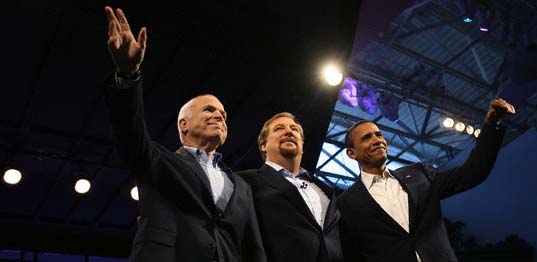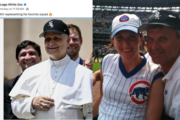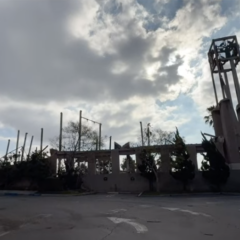Four years ago this week, Rick Warren and Saddleback Valley Community Church in Orange County, California hosted the first campaign meeting of presidential candidates Barack Obama and John McCain. Warren called it the Saddleback Civil Forum on the Presidency, and structured it as a set of interviews so that the candidates would meet with him separately on stage, each answering identical questions. As the announcement of the event in late July of 2008 was reported in almost every major U.S. media outlet, and even garnered coverage abroad, critics quickly expressed fear at the thought of a megachurch and its pastor holding such prominent positions in a presidential campaign.
It was bad enough for religious figures to endorse particular candidates, they argued, but here was a strongly evangelical pastor presiding over one of only a small handful of candidate meetings (Obama and McCain would go on to hold three face-to-face debates in the following months). At a minimum, it seemed, the event legitimized a particular religious group as an arbiter in American electoral politics; at worst, it allowed a particular religious group to tip the scales of a democratic election in an anti-democratic way.
Was it a slippery slope to theocracy, as some critics argued? As I show in the forthcoming book, Sacred Subdivisions: The Postsuburban Transformation of American Evangelicalism, which centers around 18 months of field work at Saddleback and surrounding communities, Warren and Saddleback did very little to wring any sort of political results from that unique event. While some aspects of the event appeared questionable, the sermons and programs at Saddleback in the following days and weeks were remarkably anodyne and apolitical. As I relate in a chapter on the event:
Far from being an act of encouraging political engagement, however, the incorporation of [the Civil Forum on the Presidency] into the American political process was seen by Warren as a way to legitimize the church, not sacralize politics. The forum was not followed by voter registration drives at the church, as in the past. Nor was it followed by a politically relevant sermon or church campaign. In fact, three weeks after the Civil Forum, Saddleback launched the “Forty Days of Love” campaign, which consisted of a series of sermons and small-group study guides centered on [a Saddleback pastor’s] new book about relating with Christlike love to those close to you. It could not have been more apolitical. (p. 158)
So while critics were worried about the rise of American theocracy, might it have been the case that the Saddleback Civil Forum on the Presidency was political evangelicalism’s national denouement? If so, it didn’t go out with a bang, but instead exited quite gracefully (or, rather, civilly). A pastor and church that in 2004 had rallied its members to vote for the candidate who opposed same-sex marriage, stem-cell research, and abortion (no candidates’ names were mentioned, wink, wink), in 2008 simply hosted a “civil” event that allowed each candidate equal time and opportunity to express his views, and left it that. (Although, there was the later matter regarding a certain state ballot measure.)
And in 2012? So far, there has been no hint that any “civil” event is on the horizon, nor any Saddleback-sponsored political event for that matter. The closest Warren has come to the political arena this year is when he tweeted on August 1, that the CEO of Chik-Fil-A called to tell him that they had ran out of chicken on a day that was supposed to symbolize anti-same-sex marriage views. But even then, Warren deleted the tweet within a day.
It could be that evangelicals are just sitting this election out or will vote with little enthusiasm, as many have argued. But I think something much bigger is going on. Regardless of the religion of the Republican candidate, no big religious policy issues are even up for debate this year. Same-sex marriage? It seems like an issue that is best left to the fast-food sector. Abortion? A down-ticket issue that can only mobilize local pockets of voters but is a loser on the national stage. Stem-cell research? It’s hard to imagine that this was ever an issue.
There is no daylight between Romney and evangelicals on these and just about every other issue that matters to the religious right. So why the silence? It has something to do with what makes places like Saddleback Church work so well. The focus there is on intimate relationships that are nurtured in small groups; on personal growth achieved through service work (what they call missions); and on private, individual happiness underwritten by a clear and accessible evangelical narrative of self and society.
The old battleground of the culture wars is a strange land to many of today’s megachurch evangelicals. While the substantive views on these matters might not have changed much (though there is evidence of some shift), they just don’t make as much sense in the context of a popular, contemporary evangelicalism that is much more concerned about personal well-being. Therefore, we shouldn’t mistake the latter’s absence in the 2012 presidential election for its decline. American evangelicalism is alive and well. It’s just that its lifeblood is no longer culture war politics.
Justin Wilford is a guest contributor with the USC Center for Religion and Civic Culture.








